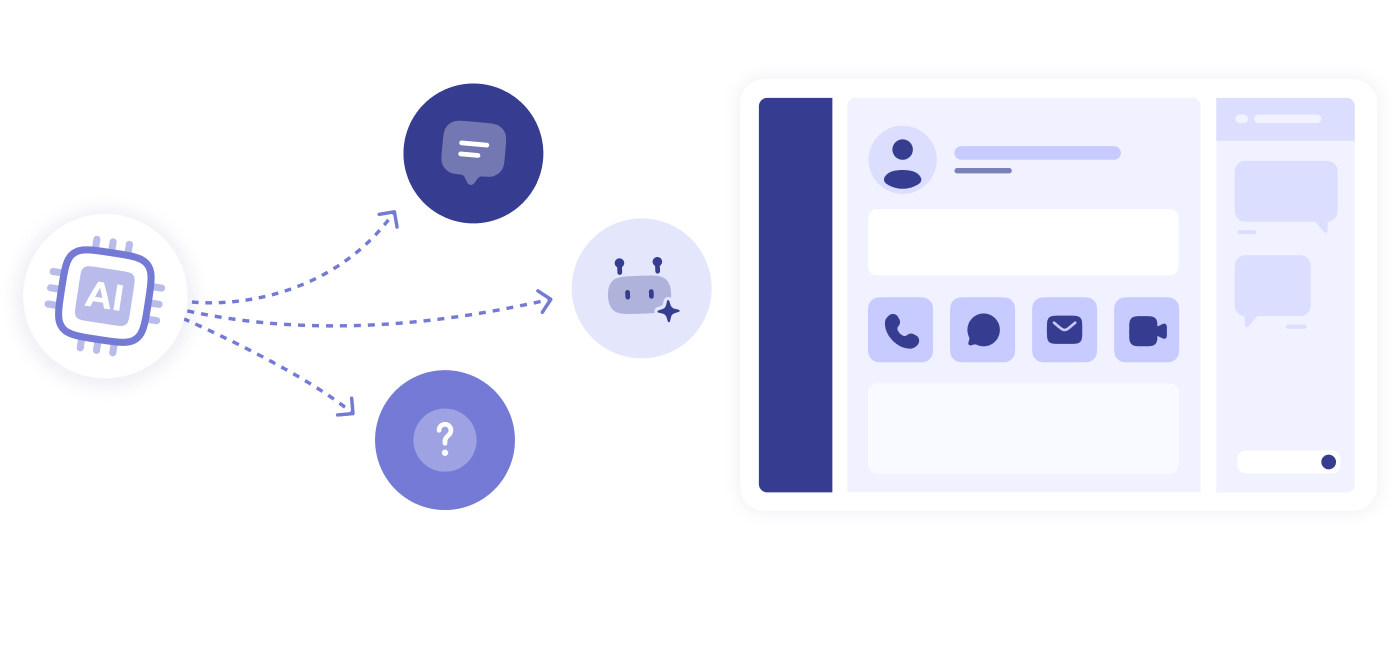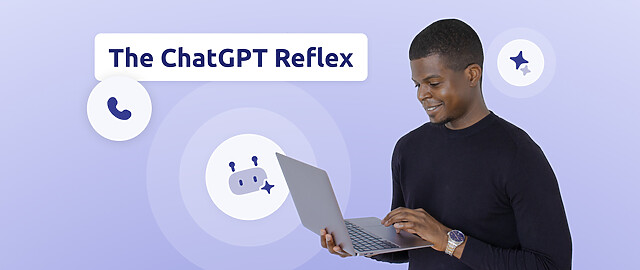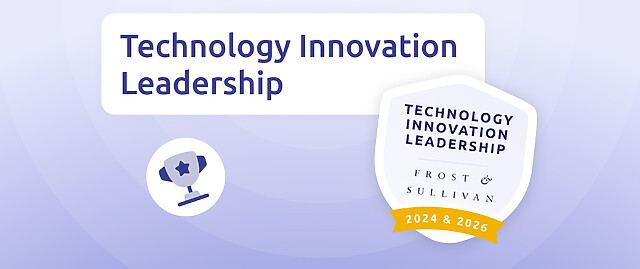ChatGPT Is the New Go-To for Customer Questions
A New Everyday Digital Habit
Since its launch in late 2022, ChatGPT has gone from novelty to mainstream. Initially used to draft emails, summarize documents, or explain complex topics, it’s now being turned to for practical, real-life issues.
From error codes on washing machines to oil changes, Wi-Fi outages, ovens that won’t heat, or missing user manuals, many consumers now ask ChatGPT before turning to customer support or dedicated self-service tools. It’s faster, simpler, and always within reach, on a phone, a computer, or even through a voice assistant. AI has become a 24/7 tool for consumer autonomy.
Generative Self-Service: Fast, Intuitive, and Reassuring
ChatGPT’s appeal lies in how easy it is to use, and how instantly it replies. Users ask questions in plain language and get immediate, often structured responses. They can dig deeper with follow-up questions. The conversational tone makes the interaction feel more human. The instructional style builds trust. It’s now common to read: “Explain to me in simple terms how to…” And even faster to upload a photo and ask “fix this.”
OpenAI’s recently announced “Operator” mode takes this further by allowing ChatGPT to interact with real-time data and perform actions directly on web interfaces via live screenshots. This raises new challenges for companies building customer self-service experiences: How do you offer something just as smooth—but more accurate and tailored to the customer context?
ChatGPT has become a go-to self-service tool: no subscription required (for the basic version), always available. But the great flexibility comes with real downsides.
When Generative AI Gets It Wrong: The Risks of Unsupervised Selfcare
ChatGPT isn’t a certified source. It can give outdated, incorrect, or misinterpreted information. If a customer asks how to open a locked washer and the AI suggests forcing a part, the outcome can be costly: voided warranties, damaged equipment, even personal risk.
Other examples are just as concerning: unsafe electrical fixes, incorrect instructions for resetting systems, or advice that doesn’t apply to a specific product. These mistakes often lead to customer frustration, and sometimes even more calls to support after a failed selfcare attempt.
Some users have even turned to ChatGPT for advice on medications or health topics. These areas are typically handled by pharmaceutical companies via specialized call centers and dedicated self-service tools built with strict regulatory controls.
Still, the ChatGPT reflex is gaining ground. According to a study by the University of Sydney, “9.9% of respondents used ChatGPT to get health-related information in the last six months.”
The appeal is clear: fast access and easy use. But in high-stakes situations that require expert advice and real personalization, relying on generative AI can lead to harmful outcomes.
Why Specialized Customer Self-Service Tools Still Matter: Accuracy and Context

The Power of Contextual AI and Business-Specific Knowledge
Unlike ChatGPT, enterprise selfcare solutions are built on proprietary knowledge bases and trained using real customer-agent interactions and historical wisdom. Whether it’s a manufacturer, a service department, or a support team, internal data ensures the AI is answering in line with company policies, safety standards, and customer context.
This minimizes error, strengthens trust, and delivers a better user experience.
Smarter Tools: From Chatbots to Dynamic FAQs
Modern customer self-service solutions include:
- Domain-specific chatbots,
- Virtual agents powered by advanced NLP,
- Voicebots to automate phone support,
- Dynamic FAQs tailored to user navigation,
- AI assistants embedded in apps or customer portals.
These tools not only reduce inbound calls—they also drive higher satisfaction. A well-built FAQ, for example, can cut contact center volume by up to 40%. At Diabolocom, AI and machine learning are natively integrated to deliver company-specific selfcare at scale.
Machine Learning for Personalized Responses
Selfcare solutions powered by machine learning analyze past interactions like contact history, user journeys, and intent. They infer what users really mean, adapt responses, improve precision, and guide users more efficiently.
This continuous learning approach also helps flag complex situations that require human intervention—reducing unnecessary escalations and optimizing team effort.
Why Human Agents Still Matter
The Limits of Digital Selfcare
No matter how advanced, digital selfcare can’t handle everything. Complex cases and emergencies still need a human touch. And when a customer has already tried multiple tools without success, talking to an agent becomes essential to defuse tension and find a fast, tailored solution.
Reframing the Agent’s Role
Selfcare tools are designed for simple, repetitive requests. By automating these, agents are free to focus on what really needs their expertise like complex or high-stakes situations. This shift gives new meaning to their work, reduces cognitive overload, and boosts workplace well-being.
The human-AI duo works best as a team: AI brings speed and consistency; agents bring empathy and adaptability. This balance means agents have more time to handle meaningful conversations—and that leads to better first-call resolution, stronger CSAT and NPS, and a clear recognition of their value. Not to mention a noticeable drop in agent turnover.
The Synergy Between Human Agents and AI-Powered Contact Center Solutions

Smarter Training, Faster Skills Development
AI is no longer just about streamlining calls. It’s also a game-changer for continuous agent training.
Real-time conversation analysis highlights strengths and areas for improvement in every interaction. These insights fuel personalized training programs based on actual scenarios—not theory. The result? More confident, better-prepared agents who can handle complex cases with ease.
Far from replacing humans, AI helps agents level up—faster and more effectively.
Post-Call Support: AI Doesn’t Clock Out
AI also handles post-call tasks: summarizing conversations, updating records, enriching knowledge bases. It even contributes to quality monitoring by spotting compliance issues and scoring call quality.
This boosts traceability, compliance, and overall service performance. Managers get real-time insights to track team performance, tweak processes, and take action fast. The customer experience keeps improving—measurably, consistently, and strategically.
Conclusion: Selfcare 3.0—Balancing Autonomy, AI, and Human Expertise
Customer selfcare is undergoing a major transformation. With ChatGPT, users are taking initiative and expecting instant, conversational answers. But that autonomy needs structure. AI-generated responses are still generic, sometimes wrong—and in certain fields, downright dangerous.
To deliver safe, effective selfcare, companies must combine multiple pillars: generative AI, specialized solutions, and human expertise. By embedding these elements into a CCaaS platform like Diabolocom’s, they can offer smooth, contextual, omnichannel experiences.
As AI gains momentum, it’s critical to build models on reliable foundations, tailored to each industry’s needs. ChatGPT may offer quick fixes—but it can’t replace a solution built for responsible, trustworthy support and relationships.
To give your customers safe and dependable autonomy for everyday requests, the most effective approach is to integrate an AI solution tailored to your business. By drawing on a knowledge base built from real-life use cases, this personalized AI can deliver precise, context-aware answers while preserving the tone and style your brand is known for. When combined with a powerful CCaaS platform, it creates a seamless framework that enhances agent efficiency and elevates the customer experience.
Enhance your customer self-service strategy with specialized AI



